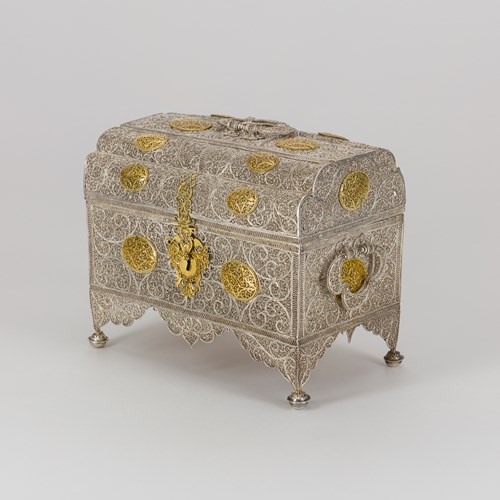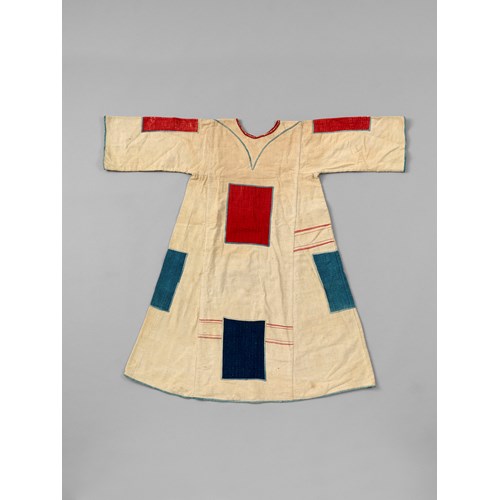Marketplace
Hispano-Moresque Lustre Dish
Hispano-Moresque Lustre Dish
Date circa 1550-1600
Period 1400-1600, 16th Century
Origin Spain, Aragón, Muel
Medium Ceramic, Tin-glazed
Dimension 24 cm (9¹/₂ inches)
A heron-like bird is the main motif on this shallow, tin-glazed dish. Decorated in a brownish lustre, the bird fits within the centre of the dish and is surrounded by four panels set equidistance apart. These panels extend from the centre of the dish to the rim, and each panel contains a bold abstract motif depicted in reserve. Alternating with the panels are four pinecone designs encircled with dots and filled with dotted square patterns. Sketchy motifs of paired flowers fill the remaining spaces, and a large spiral is painted in lustre on the reverse of the dish.
Central bird motifs in the style depicted here are in keeping with contemporary designs of ceramics produced in Muel, Aragón, in the north-east of Spain. By the 16th century the production of ceramics had increased in Muel and lusterware in particular was made in great quantity. Similar examples can be found in the Musée des Beaux-Arts, Lyon (Accession Number E 538-27, and illustrated in Le calife le prince et le potier, p. 141) and the Museu de Ceràmica, Barcelona (illustrated in Ray, p. 132, fig. 14); the former particularly close in composition save the upper left corner bearing one large panel instead of two. A further example in the form of a bowl with handles from the Victoria and Albert Museum, London (Accession Number 31-1907, and illustrated in Ray, p. 133, no. 272) presents a similar bird motif flanked by only two panels and surrounded by vegetal designs.
Stock no.: A4681
Central bird motifs in the style depicted here are in keeping with contemporary designs of ceramics produced in Muel, Aragón, in the north-east of Spain. By the 16th century the production of ceramics had increased in Muel and lusterware in particular was made in great quantity. Similar examples can be found in the Musée des Beaux-Arts, Lyon (Accession Number E 538-27, and illustrated in Le calife le prince et le potier, p. 141) and the Museu de Ceràmica, Barcelona (illustrated in Ray, p. 132, fig. 14); the former particularly close in composition save the upper left corner bearing one large panel instead of two. A further example in the form of a bowl with handles from the Victoria and Albert Museum, London (Accession Number 31-1907, and illustrated in Ray, p. 133, no. 272) presents a similar bird motif flanked by only two panels and surrounded by vegetal designs.
Stock no.: A4681
Date: circa 1550-1600
Period: 1400-1600, 16th Century
Origin: Spain, Aragón, Muel
Medium: Ceramic, Tin-glazed
Dimension: 24 cm (9¹/₂ inches)
Literature: Le calife le prince et le potier: les faïences à reflets métalliques, Musée des Beaux-Arts, exhibition catalogue, Lyon, 2002.
Ray, A. Spanish Pottery: 1248-1898, V&A Publications, London, 2000.
More artworks from the Gallery






 with Mother-of-Pearl Handle_T638839371438778571.jpg?width=500&height=500&mode=pad&scale=both&qlt=90&format=jpg)

